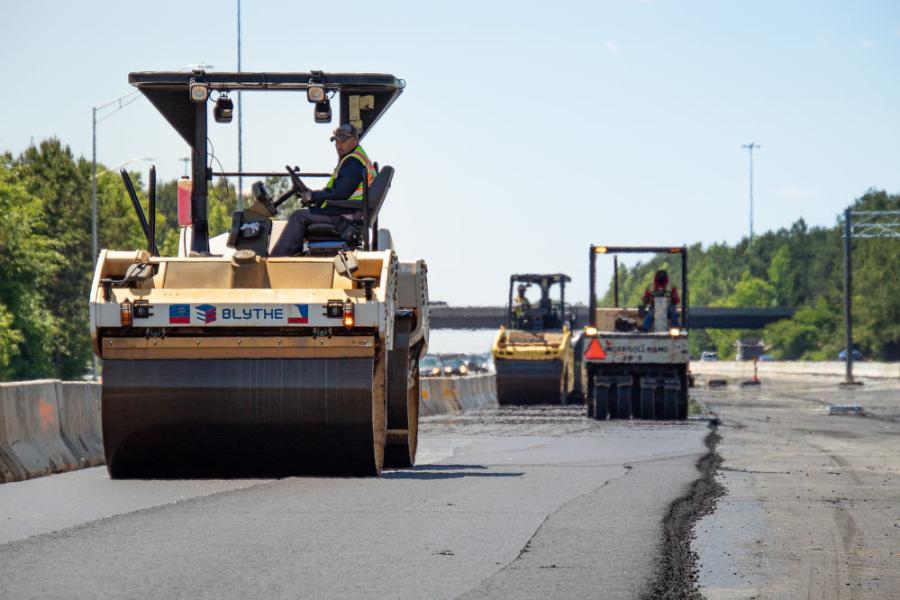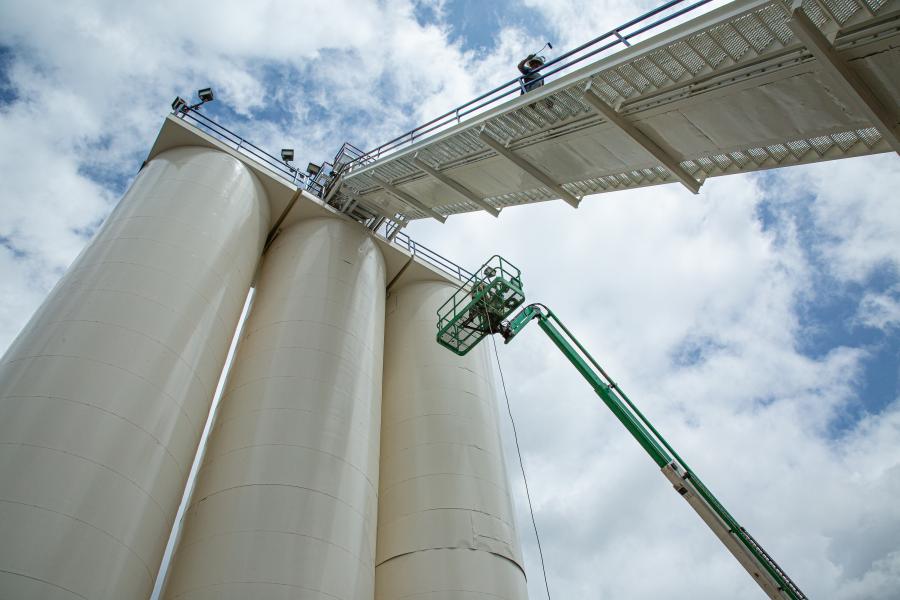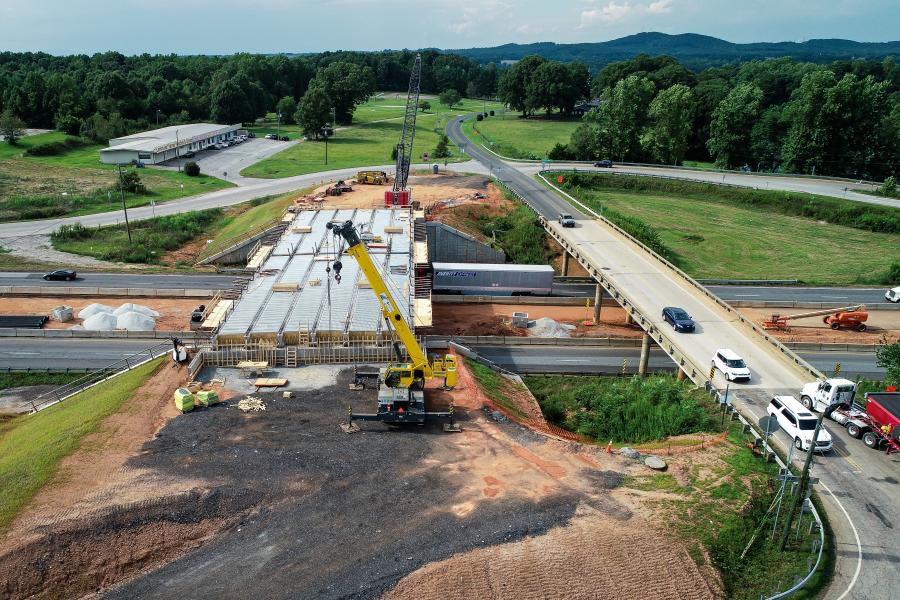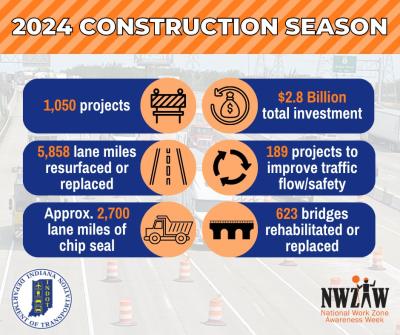Asphalt paving operations in the medians of the I-485 Express Lanes project in southern Mecklenburg County. The newly paved surfaces will become variable-toll express lanes and general purpose lanes along the 18-mi.-long project zone.
Surviving a hundred years of market boom and bust, cultural tumult and technological change is no small feat for a company. Blythe Construction Inc. has managed the feat and is well-positioned to grow its presence as an industry leader as its second century begins.
The current generation of leadership at the Charlotte, N.C., firm wasn't there, of course, back in 1921 when Blythe Brothers Construction was formed. In that day, the brothers Blythe moved material with a scoop pulled by a team of mules. The new company's first job was to surface a segment of Lawyers Road, a roadway that still meanders southeast out of Charlotte toward Unionville.
Today, Blythe Construction is a full-service construction company capable of handling projects of virtually unlimited size and scope. It annually produces some $400 million in revenue, evenly split between heavy highway construction and asphalt paving. While it hasn't a single mule in its stable of equipment, more than 400 state-of-the-art machines are cranked up each week to work job sites across North Carolina.
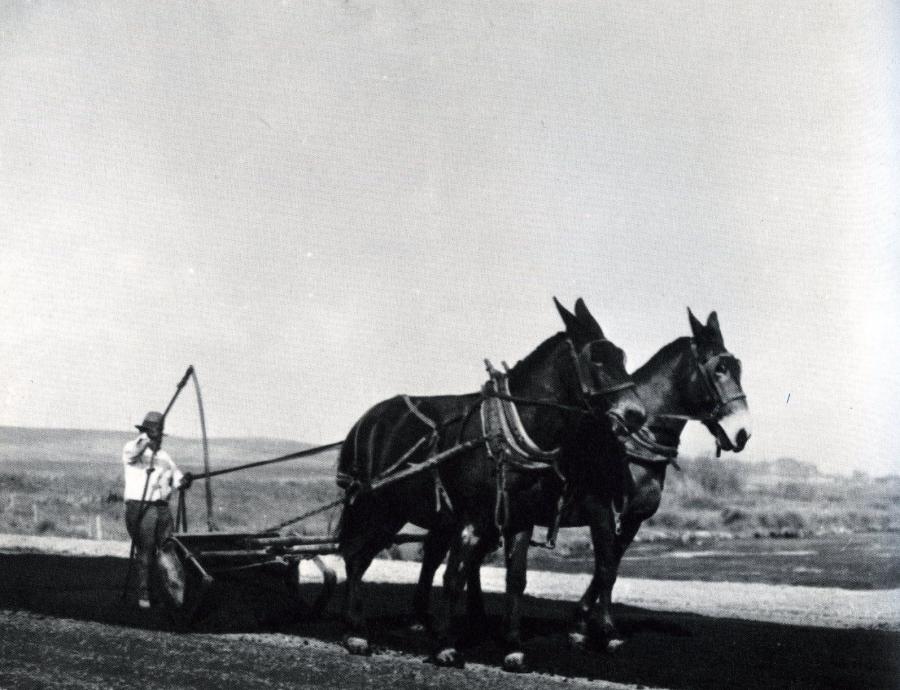
Probably the earliest shot of Blythe Brothers Construction. Mule-drawn road grading. It's possible this is from Lawyers Road (Blythe's first-ever roadway project).
What's more, Blythe also is involved in projects in South Carolina and, as part of Eurovia USA, the full length of the East Coast and in Texas. It is working on 25-30 construction projects at any given time, most of them in North Carolina, with fully 65 percent of the company's annual revenue generated in the Charlotte metro area.
While the scale of Blythe Construction operations since 1921 has grown exponentially, the expansion doesn't seem to have unmoored the company from its core principles. Blythe's senior vice president of construction, Brian Webb, said he believes the company operates with the same business ethos as in the beginning.
"Blythe long has been recognized as a leader in state highway work in North Carolina, as a company that delivers projects on time," he said. "We still do that today. Over the years, we have managed to retain the respect of stakeholders as a dependable partner."
Webb, who has been at Blythe for 23 years, was asked if one project or another stands out in memory for the size of the contract or the difficulty in completing it. He said none does.
"Each project reflects the character of the work that we do. Whether it is a $500,000 parking lot for CVS Pharmacy or a multi-lane highway project, it is a proud moment for us when we finish it. No matter the size of a project, we work to complete it on time, within budget, and safely."
**
In the decades following its founding, Blythe Brothers grew its highway construction and paving business. World War II impacted its business model, with the company contracting to build part of the brand new U.S. Marine Corps training base in Jacksonville, N.C., called Camp Lejeune. Other tangents included establishment in the following decade of asphalt paving subsidiaries in Puerto Rico and the Virgin Islands, enterprises that eventually folded.
In the mid-1980s, Blythe Brothers entered a period of ownership changes. First, the company was renamed Blythe Construction when it was acquired by Alfred McAlpine, a British construction group. That association lasted for more than a decade. In 1998, Blythe Construction was sold and became part of Hubbard Construction, a heavy general contractor that still works the length and breadth of Florida. Two years later, Hubbard Group, including Blythe, was acquired by Eurovia, which is a division of VINCI Construction, headquartered in France.
So, today, Blythe Construction is a subsidiary of a transportation construction and commercial development organization that operates in 16 countries. Multi-level corporate structure notwithstanding, Blythe and the other Eurovia subsidiaries operate quite autonomously, while at the same time having the resources of Eurovia to draw upon.
Webb said becoming part of the umbrella Eurovia Group had negligible impact on administration and operations at Blythe. The acquisition was all upside for the company.
"Being a part of a larger organization provides us with additional resources, including expertise of one kind or another," Webb said. "For example, Eurovia has a research and development program that develops asphalt products that we can take to our clients."
He said the culture of Eurovia is progressive and gives as an example an annual "innovation competition" within the organization. Member companies are challenged to submit new ideas on tackling old challenges. With participants bringing to the competition their work experience in many different global settings, the forum produces a broad spectrum of fresh thinking. "It's good to see ideas," Webb said, adding mischievously, "I'm not above stealing a good idea."
Blythe Construction is a busy company and one busily involved in big projects. Its biggest current job as measured by project cost, at least, is construction of 18 mi. of high-occupancy toll lanes on Interstate 485 on the edge of Charlotte. The cost of the three-year project is $346 million and also involves building 17 traffic structures and 15 mi. of sound-buffeting wall.
The project is the largest project currently worked by Blythe as sole contractor, but even larger joint venture jobs are under way. A $403 million reworking of the Interstate 540 loop road around Raleigh was contracted in tandem with Lane Construction, a leading national construction company. In South Carolina, Blythe is widening 21 mi. of Interstate 85 in a venture with a Texas company, Zachry Construction. The price tag of that project is $435 million.
All of the aforementioned undertakings are design-build projects, which Blythe prefers, according to Webb. DOT administrators in both North and South Carolina have increasingly opted for design-build contracts on large projects and that's OK with Blythe.
"In design-build jobs, we can bring everything to the table that we do and bring full value to a customer," Webb said. "We produce and lay asphalt, we have our own pipe crews, we build bridges. With design-build, we can bring all of those abilities to bear and deliver quickly. That's what our clients want."
Approximately half of Blythe's highway contracts are design-build.
Not every Blythe job is on public roadways. Webb estimated that 30 percent of construction activity is in commercial developments — parking lots and other projects not funded by tax dollars. Fully 40 percent of all asphalt produced by Blythe plants is sold externally rather than earmarked for company projects. "And most of that is going to private projects."
The work of the company is spread across North Carolina, but that doesn't mean Blythe crews work one week in Charlotte and the next in Raleigh. Webb said, "We consider ourselves a regional contractor, but most of our employees commute every day. We don't really shift our people from one area to another. In a pinch we'll do that, but generally we like our employees to drive back home every day."
The senior vice president noted that despite the company's focus on roadway construction and paving, Blythe Construction is what Webb terms "a little bit" diversified. Pretty significant diversification, actually. The company operates a pre-stressed beam manufacturing plant that turns out 60,000 linear ft. annually, producing some 500 bridge beams a year and some $10 million in revenue. Its asphalt emulsion plant also generates $10 million in revenue annually.
**
The alphabet of services and products offered by the hundred-year-old company begins with A, as in Asphalt. The first modern plant to produce the bituminous product in the United States was built about 1900 in New England and just two decades later the Blythe brothers were paving with asphalt in North Carolina. Today, Blythe has 12 asphalt plants in North and South Carolina and in 2020 produced some 2.3 million tons of the product. The division employs approximately 400 people.
Each plant can produce whatever special mix is required for a paving job, from open-graded porous asphalt to denser pavement, from hot mix to warm mix.
"It partly depends on where a plant is located," said Allen Hendricks, Blythe's vice president of asphalt. "South Carolina uses a lot of open-grade mixes, for instance. North Carolina uses some but not as much."
The plants are state-of-the-art, as certified by the National Asphalt Paving Association, which has awarded each plant its Diamond Achievement Award. The award recognizes excellence in several areas including efficiency of operation, appropriate environmental practices, and safety. In addition, three Blythe plants in the Carolinas have been recognized by the U.S. Environmental Protection Agency as Energy Star facilities, each plant having reduced emissions by 10 percent over a year's time.
"We always are looking for new and improved versions of equipment," said Hendricks, an 18-year employee of the company. "We change out a lot of storage tanks and a lot of burners to put in more efficient models and utilize more efficient dryers as they become available. We're moving from natural gas to electric where we can, trying to reduce our carbon footprint. Eurovia is making a big push to reduce greenhouse emissions, which is good for everyone."
The breadth and character of Blythe's asphalt production changed dramatically with a pair of acquisitions. In 2005, Blythe and Eurovia acquired two Crowder Construction plants in Charlotte, which catapulted Blythe to the top of asphalt production in the Charlotte area. In 2018, the company led Eurovia's acquisition of the asphalt plant and paving division of Lane Construction.
Integrating Lane's facilities into Blythe's North Carolina operation doubled the number of plants in the state. Significantly, it opened the way for Blythe to re-enter the all-important Raleigh market area. North Carolina's capital city is a fast-growing urban metro with lots of old pavement to be milled and resurfaced and new pavement to be built.
"Acquiring Lane increased our footprint," Hendricks said. "The biggest effect of it was Blythe getting back into the Raleigh market and we've increased the footprint of emulsion sales to our sister companies, including in Virginia."
Across America, bituminous pavement is everywhere one looks — on highways and streets and runways, in commercial parking lots and private driveways, winding through parks as all-weather pathways and, yes, on go-kart racetracks. One of Hendricks's favorite applications was on such a track in Mooresville, north of Charlotte. Some 3,500 tons of hot mix was laid at the GoPro Motorplex facility.
"It was technically very difficult," Hendricks recalled of the project. "We used a highly polymer-modified special asphalt designed for racetracks."
For the first time, Blythe crews used "trackless tack," which unites old and new pavement layers without adhering to tires. GPS grade control technology guided two side-by-side pavers to eliminate cold joints and create an almost perfectly smooth surface for the small racers. "It's quite the facility."
In the urban centers of the state — Charlotte, Greensboro and Raleigh-Durham — and in Columbia in South Carolina, as much recycled material as possible is being used in Blythe's asphalt production. Plants located in less developed areas have less access to reclaimed asphalt and, therefore, recycle less.
"When I got into the business in the 1980s, we were lucky to recycle 15-20 percent of reclaimed material," the vice president said. "Now our norm is more like 40 percent, which is much better for everybody. We still have some customers who hesitate to use much recycled material, but a study out of Auburn University showed high recycle-mix performs just as well as a lower mix. We promote its use."
**
Blythe Construction's 400 pieces of equipment in North Carolina constitute about a third of Eurovia USA's entire fleet of machinery. The machines working in the Tar Heel State are serviced in maintenance shops in Raleigh, Greensboro and Charlotte. Sixteen mechanics and technicians are scattered among the shops.
The 10-bay maintenance facility in Charlotte focuses on paving equipment. That reflects the key role of asphalt for the company in the Charlotte metro area: Six of Blythe's 12 bituminous plants are in and around Charlotte. It was in the Wilkinson Boulevard shop in Charlotte that an innovative piece of new equipment was unveiled in July.
It was an eco-friendly asphalt distributor built by Etnyre, an Illinois equipment manufacturer. The machine was built at the request of Blythe and Eurovia leadership. The goal was to have a distributor in which liquid asphalt is heated without use of liquid propane gas or diesel fuel. Etnyre's truck-mounted "Green Distributor" prototype features element-style electrical heaters and a hydraulic-driven generator. The truck's Tier IV diesel engine powers the hybrid unit.
"We always are looking for green options," said Wayne Thompson, Blythe's regional equipment manager. "We're embracing hybrid technology. Blythe's goal is to reduce our carbon footprint by 40 percent by 2030. That's a pretty lofty goal, I know, but when manufacturers offer hybrids, we're going after them. We have a couple of pieces in the fleet already and have rented some."
The company primarily owns its operating equipment, leasing "very little," according to Thompson, and supplementing only as needed with rental units. Fully 40 percent of machines in the fleet are branded Caterpillar, a percentage that holds steady across the company's construction, dirt-moving and paving divisions. "We're loyal to customers that provide excellent customer service, and we've built many great working relationships over the years," said Thompson.
The company's standard practice is to own a piece of equipment for as many as eight years and then trade it in for a newer model. This replacement schedule runs counter to the growing trend in the construction industry to lease or rent equipment short-term.
"We have a pretty good system," the equipment manager said of Blythe's approach. "Running a machine from cradle to grave — that's been the philosophy here for years and we're not going away from it. Use them up and dispose of them."
Keeping the numerous machines running smoothly for the duration of their service, that's the trick, of course. Blythe Construction mostly leans on manufacturers and dealers for that. Thompson referred to his technicians as "firemen." That is, they are dispatched to determine the cause of an equipment failure or a faltering condition, with dealer techs then called for any significant repair work.
"We use most of our techs for quick get-it-going fixes and rely heavily on dealers for the major work," Thompson said. "Years ago, you could have seen a dozer in our shop with the engine pulled out. But with all the ongoing changes in electronics, we now rely on dealers for those repairs. It's kind of a change in the flow of business in the last few years."
All the electronic wizardry in today's equipment can be daunting to long-time machinery operators in the industry. They miss working with relatively simpler machinery.
"The days of injecting something to fire up an engine are gone," Thompson said. "But there are benefits to the new equipment, including telematics. We're a heavy user of it, tracking our idle time, our utilization of a machine. It helps us in many ways."
**
On the Blythe Construction website, employee safety is called the number-one priority. Ross Peters, the company's safety manager, was asked if keeping employees safe indeed ranks higher than producing quality products. He responded that they are all intertwined.
"Productivity and quality of a product are important, but safety still is number one for us," Peters said. "One reason why is that over the years we have seen that we provide the highest quality work when our team members can work safely. When you take care of the team, it sends the message that you care about people and the rest falls into place."
So, managing safety is really an umbrella management task.
Peters earned a master's degree in safety and emergency management and has supervised the safety of Blythe's approximately 1,000 employees for nine years. The company's "industry-leading culture of safety," as noted on the website, is quantified this way: Injuries occur at Blythe about half as frequently as in the industry as a whole.
"The culture of safety is more about how we respond to unsafe situations. Our people proactively look for what needs correcting to make a situation safer and then correct it. They do that because they're trying to do the right thing and they see the benefits in working safely."
From the executive suite, the view of safety is the same. Webb said that "safety here is serious business, from top to bottom. Our employees recognize that we provide the tools and PPE to safely do a job, but we also provide the training to make sure that, day-to-day, they are safe." That includes "job safety analysis" meetings at the beginning of each company workday. "We make sure employees who are engaged in that morning conversation fully understand what is going on that day."
Peters concurred that at the plant and on the job site is where the culture of safety is cultivated. The company doesn't rely on specially designated personnel to monitor safety conditions. Rather, he said, "if you are in charge of production, you are in charge of safety for your team. It all happens at the operations level."
Workers most in danger on a typical day are those working outside a vehicle, said Peters.
"Anyone not in a piece of equipment is at highest risk. Concerns revolve around people on foot not being seen, that is, working in traffic or around big machines or in work zones where the traveling public buzzes by at 85 mph."
As an example, he cited the three people in a crew of 10 who are not on the paver during asphalt-laying. They are nearby, setting cones or raking asphalt.
Budgeting for safe workplaces is not necessarily a separate line item in Blythe projects. That's because production and safety are mostly intertwined from conception through completion of a project. Peters said "safety and operations are so integrated that it's all really just part of operations. An example is a trench box. It's used to help excavate but also is there for safety. Hardhats and personal protection equipment are as much for production as for safety."
Technology has impacted safety in recent years, mostly for the better. Back-up cameras and sensors are valuable additions to safety equipment, Peters noted, whereas cell phones are a major "distraction" to personal awareness in workplace situations and can be hazardous.
The safety manager believes the company's successful program is all about educating employees to recognize dangers and act in ways that will protect themselves.
"That's where we start. After that, the expectation is that if you don't work safely, this isn't the place for you. The best employees are the safest employees. You can't separate the two."
**
After a full century of building roads and paving lots in the Carolinas, Blythe Construction has more-than-proven its ability to deliver products that customers need and want. Blythe leadership is confident that whatever tomorrow brings, the company will be a player in it.
"North Carolina still is a state that people are moving to," Webb said. "There are going to be tremendous opportunities in the transportation program of the state in the future, not only on the public side but on the commercial and private side. Housing, industrial, commercial, public projects — they are going to continue."
Regardless of how the transportation needs of the state develop going forward, he is confident Blythe will have a role in meeting them.
"From a logical standpoint, I think we are going to have more electrical vehicles. Light rail will be more prominent in the years to come, not overnight, but I think it will happen. Charlotte is a likely place for that to happen."
Such evolutions in transportation simply mean Blythe's project focus will evolve, too.
A cloud hovering over the industry globally is the diminishing desire of latest-generation workers to enter the construction trades and supporting tech industries. The hesitancy to pursue construction and heavy equipment careers has become pronounced over the last decade. As Webb said, "the younger generation has different expectations."
In response, the executive said, "We are doing what everyone else is doing."
This includes rewarding existing employees to retain them and working with trade schools and public schools to attract future employees. The company has an "Emerging Leaders Program" for young people in every department. The program encourages fresh thinking and professional development.
"When you sit down and talk with these young people, you learn they look at things a little differently, but they do want a successful career path. We give them a road map. They know they have to meet the company halfway, but they also know that if they put in the effort, they can rise to the top. Having that road map helps them get where they want to go."
Retention of quality employees has not been an issue at Blythe Construction, so when the company can attract new employees, odds are good that they will stay around. A recent survey by the company showed that about 25 percent of its 1,000 employees have worked at Blythe for 15 years or longer. That's not a bad foundation of loyalty on which to build a second 100 years of the company. CEG
Today's top stories



